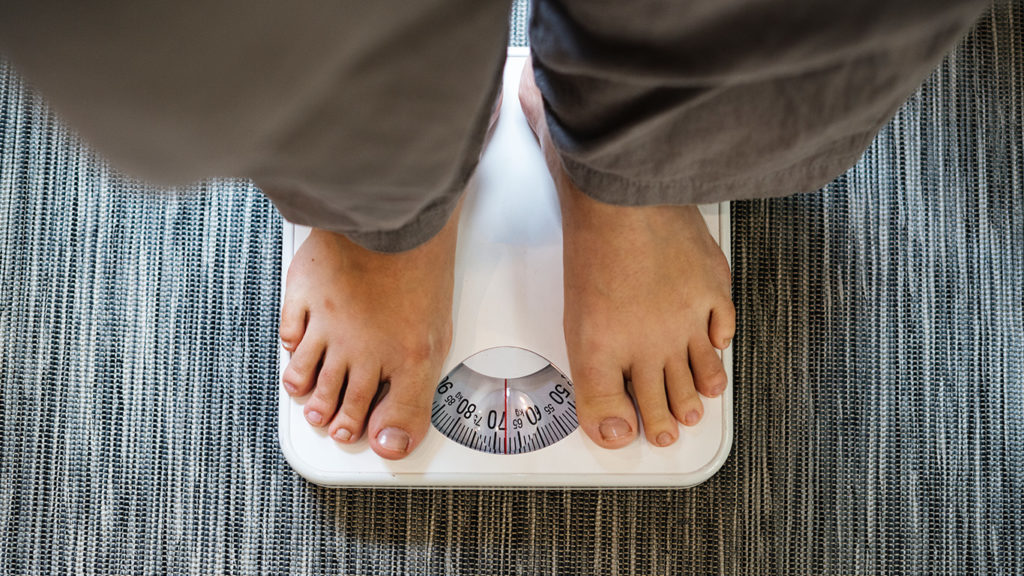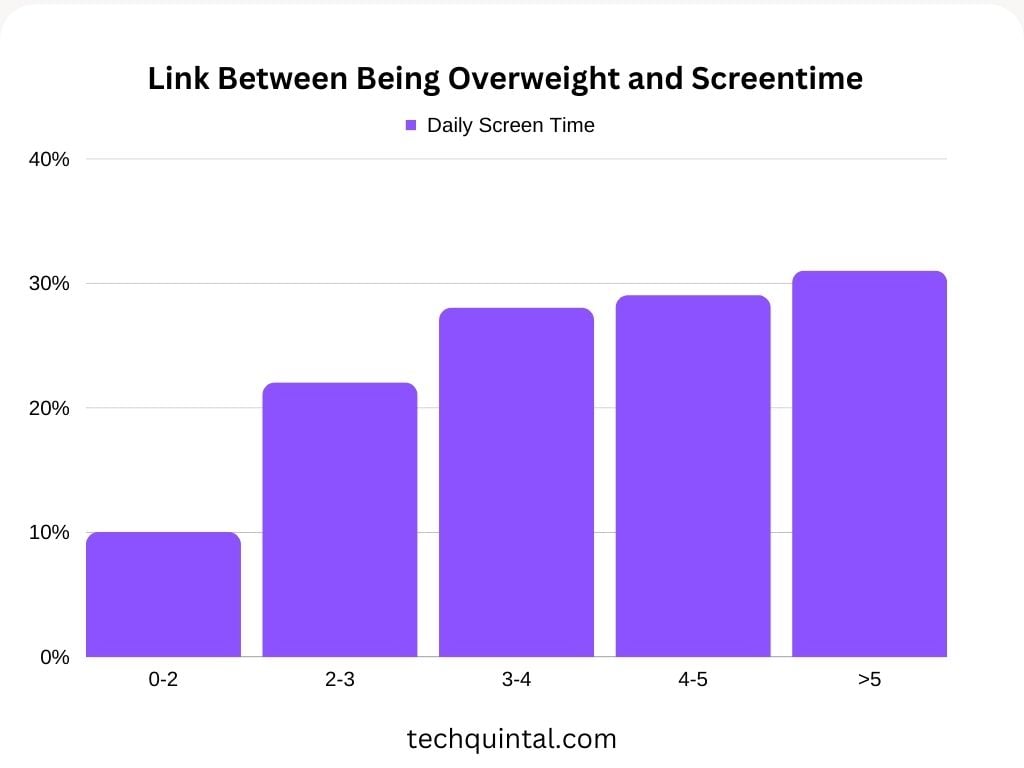
Our weight depends on the food we consume and the physical activity we perform. If you haven’t realized how technology impacts your diet and physical activity, then you should pay attention to it by now. Since modern technology gained popularity, our screen time has increased exponentially. Right from school or work to entertainment, we use our devices a lot. Several studies have been conducted, and it is found that increased screen time causes obesity. This problem is found, not only in adults but also in children. Mostly, the people who are obese in their adulthood were more likely to be obese in childhood. Today we will learn how technology leads to obesity and what we can do about it.
Quick Answer
Technology can contribute to obesity by encouraging sedentary behaviors. Prolonged periods spent on devices like computers, smartphones, or video games often replace physical activity, leading to weight gain. Additionally, exposure to online advertising for unhealthy foods and the ease of ordering high-calorie fast food through apps can promote poor dietary habits.
Problems caused by increased screen time

Increased screen time has caused many problems. People who spend more time using technology have more fats in their bodies. Similarly, people who spend less time using their screens, comparatively have lower fats. Most of the time, binge-watching and binge-eating go hand in hand.
How often do you feel the need to eat while watching something on your screen? Very often. Most of us feel this way. By the time, our series or movies end, we already have a pile of junk food packets and a heap of empty energy drink cans. What do you think will be the consequence if we keep repeating this? It will lead to obesity, which can cause potentially serious health issues.
We saw how increased screen time can cause problems, now, let’s look at the exact ways in which it creates problems.
How technology causes obesity
The technology era has changed our lives significantly. Previously, we did more manual jobs that included physical activity. It made us tired but kept us fit at the same time. People used to commute or go to places via walking or cycling. It helped them to maintain an active lifestyle.
Now, most of the tasks are performed using technology. Physical activity has reduced drastically. There’s no need for walking and cycling anymore. We have automotive vehicles that take us to places without us having to use our energy.
Following are the ways how technology leads to obesity.
Inactive lifestyle
Earlier, when technology was not that popular, children used to go out and play. There were more outdoor activities. Now most of them are glued to their devices playing games. Even adults choose screen time for entertainment. Instead of an active lifestyle, most of them are living a sedentary lifestyle because of technology. All these increase the risks of obesity and other serious health issues.
If we continue to live this lifestyle, then with time we will only be able to burn a few calories, which in turn will result in weight gain. This will also negatively impact our body’s metabolism. And, our body will face difficulty in breaking down sugars and fats.
Unhealthy eating
It’s crucial to take care of our eating habits. People don’t realize what and how much they eat while using their devices. They are distracted by what they are seeing on their screen. And, technology is the most important tool for advertisers. They use this medium to alter people’s eating habits. You are more likely to see ads related to unhealthy foods and beverages on your screen. This tempts you to purchase more of them, and eventually, you end up increasing your calorie intake.
These food products are mostly low in nutrition, and when they enter your body, you experience weight gain. Also, have you observed that when you are watching something on your screen, you are so engrossed that you don’t realize you are full, and then still end up eating more?
Disturbed sleep
Screen time messes with our natural sleep cycle. Our body produces cortisol in the morning to give us a signal it’s time to wake up and produces melatonin when it’s time to go to bed. But, if we keep using technology till late then it delays the process of producing melatonin which leads to disturbed sleep.
This causes hormone imbalance, and you feel the need to overeat, which increases your weight. We need sufficient sleep, and when our sleep cycle is disturbed due to screen time, our body produces hormones that make us feel more hungry.
What you can do about it?
If you find yourself in such a situation, then first thing, try to reduce your screen time. You can do so by tracking the time you spend on screen and looking for ways to limit it. This will help you to control your screen time and use it only when you need to. There will be lower risks of obesity as you reduce the amount of time you spend on technology.
If you see lots of low-nutrition food advertising, you can reduce your exposure to such content. In this way, you won’t be tempted to purchase unhealthy foods and beverages. Also, try to limit eating when you are occupied by your screen. This will prevent binge eating, which leads to obesity.
We have discussed how screen time can disturb your sleep cycle, and in turn, make you feel more hungry. To deal with this problem, try to get sufficient sleep and eliminate screen time before going to bed. Once your body produces melatonin to improve your sleep cycle, the other hormones causing hunger are taken care of. When you get good sleep, you don’t end up overeating. You can also try to go outdoors more. And, you will see positive impacts on your health.
Is it possible to use technology to counter obesity which is led by technology? Of course, it is. Technology impacts almost every sector of our lives in both positive and negative ways. Using the Internet too much and getting our work done digitally has made us lazy and obese, but it is possible to use the good side of tech to get healthy. Let us have a look at some of the ways by which we can use digital help to fight obesity.
Use Fitness Trackers
Fitness trackers are some of the best gadgets to keep track of your health. You may feel a bit hesitant towards them at first and not rely on them, but you will feel the difference after using them for a while. Fitness trackers and wearables like Gymwatch, Polar chest strap, etc., are no less than a personal trainer.
They allow you to measure the calories you have consumed, the number of calories you have burned, how much water you have drank, and a lot more. You can also get information on exercises and record enough data for you to help you improve. Furthermore, they will also record your heartbeats, blood pressure, etc., to ensure you are overall healthy and not just fat.
Track Your Sleep And Mental Health
Obese people report facing sleep deprivation conditions, such as Insomnia more than fit people. A good amount of sleep not only gives you proper rest but also helps you stay mentally healthy. A good body is the home of a good mind, and sleep is the secret to both.
If you feel you can improve your sleep, consider using sleep tracker apps, like Sleep As Android, etc. These trackers give you information regarding your REM (Random Eye Movement), and other sleep phases. Although you can get such information from wearables too, a dedicated sleep tracker tool is not a bad idea to use. Furthermore, if you are too serious about your sleep, you can buy smart mattresses.
Use Fitness Apps
Using trackers alone will not help you lose weight. If you want to lose weight and get healthy, you must exercise. But we understand, it is not easy to get started working hard, especially when you do not know where to start. A lot of people might think of getting coaching and using personal training, but there is a cost-effective way to look at it. Fitness apps are not less than any personal trainers.
Apps developed by leading sports companies like Adidas, Puma, and Nike, provide you with personalized training plans that help you shed that extra weight.
As you progress, the intensity of workouts increases so that you always keep moving in the forward direction. There are also flexibility options as you can decide how many and which days you want to work, and the apps will customize a plan only for you.
Here is a detailed table for more tech tools you can use to improve your health:
| Tech Tools | What They Do | Why They’re Helpful |
|---|---|---|
| Nutrition Apps | Help in tracking and planning meals. | Aid in maintaining a balanced diet and healthy eating. |
| VR Workouts | Offer interactive and immersive exercise experiences. | Make exercise engaging and fun, encouraging regular workouts. |
| Online Support Groups | Provide a platform to connect with others on a fitness journey. | Offer motivation, support, and shared experiences. |
| Smart Scales | Measure weight, body fat percentage, and more. | Give detailed insights to track progress over time. |
| Health Podcasts | Share insights, tips, and stories on health and fitness. | Provide information and inspiration for a healthier lifestyle. |
| AI Personal Trainers | Offer customized workout plans and real-time feedback. | Bring personalized fitness coaching into your home. |
| Meditation Apps | Guide users through meditation and mindfulness practices. | Help in managing stress, anxiety, and mental well-being. |
Conclusion
We learn to deal with the problems well, once we know what causes them and what options we have to make things better. One such problem is obesity. If you think technology is a culprit in your case. Try to do something about it, instead of just letting things happen. You can make better health decisions that will help you lose weight and avoid potential health concerns.
You can always start small by inculcating good habits. A few of the habits that you can follow are reducing screen time, stopping binge eating, getting sufficient sleep, and doing more physical activity. Try these, and you will see positive changes in your life.